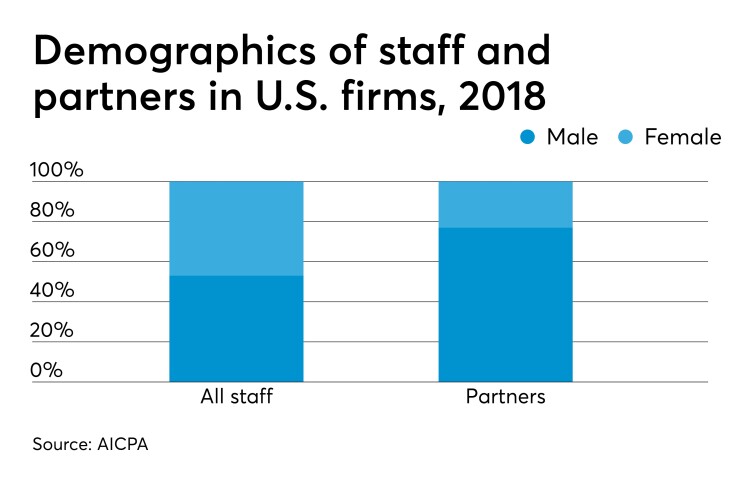Companies nationwide are beginning to prioritize and focus on the advancement of women at increasing rates. In the traditionally male-dominated accounting industry, firms are working particularly hard to increase the retention of female associates and move them into leadership roles.
According to the American Institute of CPAs’ latest "CPA Firm Gender Survey," women only represented 22 percent of partners in CPA firms in 2017. Many firms are actively leading the way to change that figure, though there is still work to be done.
Women have worked hard to earn a well-deserved seat at the table and an equal voice on issues in the workplace, and ensuring women’s voices are heard starts at the top. While most are well aware of the merits of investing in women in leadership, firms should also consider the business case for equal advancement. In a
Firms committed to investing in gender equality should begin by implementing programs designed for those in leadership roles. Doing so often allows firm leaders to learn about unconscious bias and to start at the top in developing a culture of equality.
Once leadership is on board, companies must be proactive to address the issues faced by women in the accounting profession. To do so, firms can offer educational programming throughout the year to discuss how advancement opportunities impact all staff, regardless of gender.
According to the AICPA's 2017 "CPA Firm Gender Survey," only 45 percent of firms utilize mentoring as a method of advancement. Of the firms who utilize mentorship programs, 87 percent found it made an impact on attracting and retaining talent. Other techniques include corporate sponsors (serving as formal advocates in the workplace), as well as minority and diversity inclusion initiatives. Programs such as these help to retain and attract great talent.

The need for modified work arrangements is becoming increasingly clear in today’s economy — for women and men alike. As more families become dual-income households, firms that offer flexible work environments with reduced hours, telecommuting, flextime and compressed work cycles allow employees to create a healthy work-life balance. Being responsive to individual needs and interests is also key. Listening to the charitable causes that associates care about and promoting philanthropic efforts can pay dividends for many firms in the long run.
In the movement toward equality in the workplace, firms should empower female employees, rather than spend too much time focusing on them as an affinity group. When it comes to equality, actions often speak louder than words, and investing in the advancement of female employees does not go unnoticed.
Men and women are making strides every day toward a more equal workforce. As more women enter the accounting profession, it will require the commitment of all of us to ensure women have more of a seat at the table than in the past.
We will know that we, as a profession, have succeeded when we reach a point when gender equality is so innate, it is no longer a part of the conversation.
To women in the industry, I offer this advice: Take time off when it’s needed, stay active in the profession, and cultivate a strong network. Stop apologizing and find strong female role models in your workplace. Forward progress starts with leadership willing to pioneer and navigate change throughout the entire firm. Seek out firms with leadership that demonstrates such commitment.
As women continue to move forward in accounting, the onus is on all of us to provide equal advancement for all.





